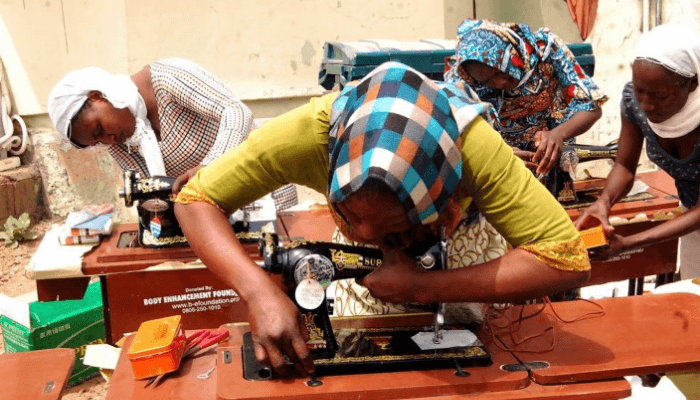Empowering women through vocational skills: Key to curbing unemployment, exploitation, gender-based violence in Nigeria
Nigeria, like many developing nations, faces significant challenges related to youth unemployment, gender-based violence, and social exploitation, including prostitution and human trafficking. Young women, in particular, are disproportionately affected by these issues due to socio-economic barriers, cultural expectations, and limited access to skill acquisition opportunities.
To address these concerns effectively, the Federal Government of Nigeria must prioritise vocational skill empowerment for young women. By equipping them with industry-relevant skills, the country can reduce unemployment, curtail exploitation, and foster economic independence among women.
Curbing youth unemployment through vocational training
Youth unemployment remains one of Nigeria’s most pressing challenges, with millions of young people struggling to find jobs. The situation is particularly dire for young women, who often face gender discrimination in employment. Vocational training offers a practical solution by equipping women with technical and entrepreneurial skills that increase their employability and business potential.
Vocational training programmes can focus on high-demand sectors such as fashion design, catering, information technology, renewable energy, and mechanics. By investing in vocational education, the government can create job-ready graduates who either secure employment or establish their businesses, ultimately reducing dependency on government jobs and handouts.
Preventing women exploitation, prostitution, and human trafficking
A lack of economic opportunities often forces young women into exploitative situations, including prostitution and human trafficking. Nigeria remains one of the countries with a high number of women trafficked for forced labor and sexual exploitation, both domestically and internationally.
Providing vocational training programmes with financial support mechanisms—such as microloans, business grants, and startup incubators—can offer young women viable alternatives to these exploitative paths. When women acquire practical skills in trades such as tailoring, agriculture, or cosmetology, they gain the financial independence needed to make better life choices, thereby reducing their vulnerability to traffickers and exploiters.
Addressing gender-based violence through economic empowerment
Gender-based violence (GBV) is a significant issue in Nigeria, exacerbated by economic dependence and patriarchal societal structures. Many women remain trapped in abusive relationships due to financial insecurity and a lack of alternatives.
Vocational skill empowerment can serve as a powerful tool for reducing GBV. When women are financially independent, they have the means to leave abusive environments and seek support. Additionally, skill acquisition centers can incorporate awareness programmes on women’s rights, legal protection, and self-defense training to further safeguard young women from violence.
Read als0: Empowering women, empowering economies: Bridging Africa’s financial clarity gap for sustainable SME growth
Bridging the gender gap in economic participation
Despite making up nearly half of Nigeria’s population, women continue to be underrepresented in key economic sectors. Traditional gender roles often restrict women to unpaid domestic work, limiting their contribution to national development.
By promoting vocational skills in non-traditional fields such as technology, construction, and engineering, the government can encourage gender inclusivity in the workforce. Incentives such as scholarships, mentorship programmes, and apprenticeship opportunities should be provided to ensure women have equal access to training and employment opportunities.
Enhancing national economic growth
A skilled and productive female workforce contributes significantly to national economic growth. Small and Medium Enterprises (SMEs) owned by women generate employment and drive innovation. When young women are empowered with vocational skills, they not only improve their personal economic status but also contribute to Nigeria’s GDP by creating businesses and job opportunities for others.
Governments at all levels should collaborate with private sector stakeholders and international development agencies to scale up vocational training initiatives, ensuring they are accessible, affordable, and aligned with industry needs.
Policy recommendations
To effectively implement vocational skill empowerment programmes for young women, the Federal Government should:
Equip vocational training centres: Increase the number of government-funded skill acquisition centres across Nigeria, particularly in rural areas.
Removing cultural stereotypes against Technical and Vocational Education and Training (TVET) in Nigeria.
Introduce financial support programmes: Provide microloans, grants, and business mentorship programmes to help young women start and sustain their businesses.
Implement gender-inclusive policies: Ensure equal access to vocational training, including in traditionally male-dominated industries, for example construction.
Strengthen laws against human trafficking and GBV: Enforce stricter penalties for human traffickers and gender-based violence perpetrators while offering protection and rehabilitation for victims.
Foster public-private partnerships: Engage with corporate organisations and NGOs to provide internships, scholarships, and funding for vocational education programs.
Raise awareness on economic empowerment: Launch nationwide campaigns highlighting the benefits of vocational skills for women’s self-sufficiency and social protection.
Conclusion
Vocational skill empowerment for young women in Nigeria is not just a necessity—it is an urgent national priority. Addressing unemployment, exploitation, and gender-based violence requires proactive government policies and sustainable programs that equip women with the tools they need to thrive economically.
By investing in vocational education, Nigeria can build a future where young women are empowered, self-sufficient, and safe from exploitation, ultimately driving social and economic transformation for the nation as a whole.
Iyama is an engineer with EQUILOG Technical Services Ltd. Lagos.




